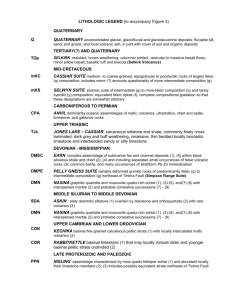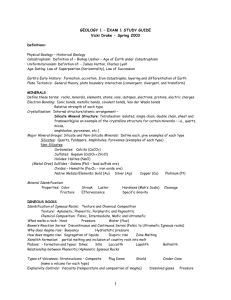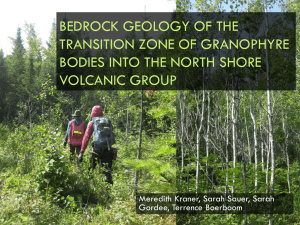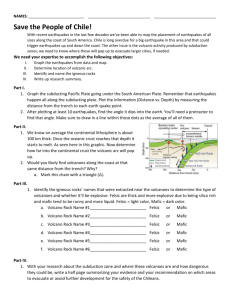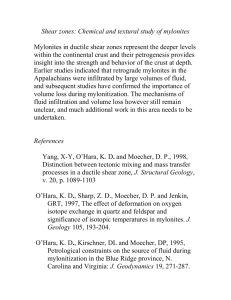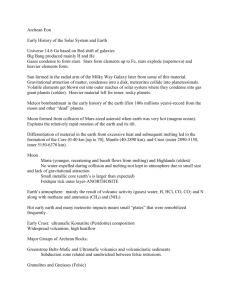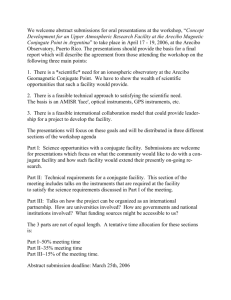sces-2015-0143
advertisement
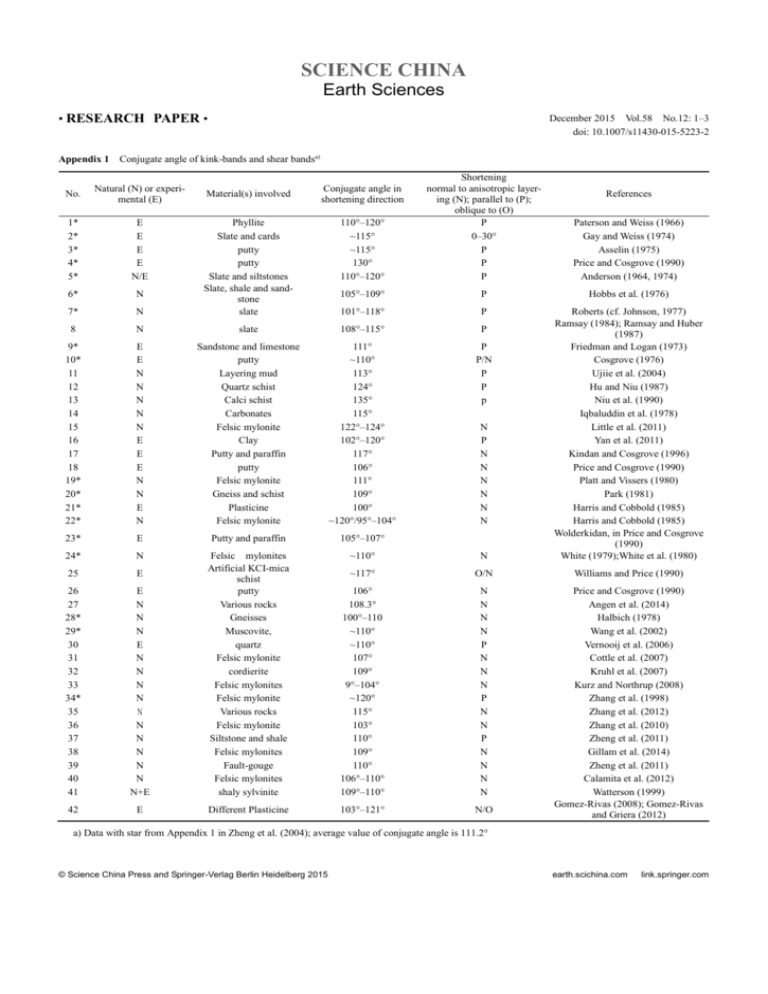
SCIENCE CHINA Earth Sciences • RESEARCH PAPER • December 2015 Vol.58 No.12: 1–3 doi: 10.1007/s11430-015-5223-2 Appendix 1 Conjugate angle of kink-bands and shear bandsa) 110°–120° ~115° ~115° 130° 110°–120° Shortening normal to anisotropic layering (N); parallel to (P); oblique to (O) P 0–30° P P P Paterson and Weiss (1966) Gay and Weiss (1974) Asselin (1975) Price and Cosgrove (1990) Anderson (1964, 1974) 105°–109° P Hobbs et al. (1976) 101°–118° P slate 108°–115° P E E N N N N N E E E N N E N Sandstone and limestone putty Layering mud Quartz schist Calci schist Carbonates Felsic mylonite Clay Putty and paraffin putty Felsic mylonite Gneiss and schist Plasticine Felsic mylonite 111° ~110° 113° 124° 135° 115° 122°–124° 102°–120° 117° 106° 111° 109° 100° ~120°/95°–104° P P/N P P p 23* E Putty and paraffin 105°–107° 24* N ~110° N 25 E ~117° O/N Williams and Price (1990) 26 27 28* 29* 30 31 32 33 34* 35 36 37 38 39 40 41 E N N N E N N N N N N N N N N N+E Felsic mylonites Artificial KCI-mica schist putty Various rocks Gneisses Muscovite, quartz Felsic mylonite cordierite Felsic mylonites Felsic mylonite Various rocks Felsic mylonite Siltstone and shale Felsic mylonites Fault-gouge Felsic mylonites shaly sylvinite Roberts (cf. Johnson, 1977) Ramsay (1984); Ramsay and Huber (1987) Friedman and Logan (1973) Cosgrove (1976) Ujiie et al. (2004) Hu and Niu (1987) Niu et al. (1990) Iqbaluddin et al. (1978) Little et al. (2011) Yan et al. (2011) Kindan and Cosgrove (1996) Price and Cosgrove (1990) Platt and Vissers (1980) Park (1981) Harris and Cobbold (1985) Harris and Cobbold (1985) Wolderkidan, in Price and Cosgrove (1990) White (1979);White et al. (1980) 106° 108.3° 100°–110 ~110° ~110° 107° 109° 9°–104° ~120° 115° 103° 110° 109° 110° 106°–110° 109°–110° N N N N P N N N P N N P N N N N 42 E Different Plasticine 103°–121° N/O Price and Cosgrove (1990) Angen et al. (2014) Halbich (1978) Wang et al. (2002) Vernooij et al. (2006) Cottle et al. (2007) Kruhl et al. (2007) Kurz and Northrup (2008) Zhang et al. (1998) Zhang et al. (2012) Zhang et al. (2010) Zheng et al. (2011) Gillam et al. (2014) Zheng et al. (2011) Calamita et al. (2012) Watterson (1999) Gomez-Rivas (2008); Gomez-Rivas and Griera (2012) No. Natural (N) or experimental (E) 1* 2* 3* 4* 5* E E E E N/E 6* N 7* N Phyllite Slate and cards putty putty Slate and siltstones Slate, shale and sandstone slate 8 N 9* 10* 11 12 13 14 15 16 17 18 19* 20* 21* 22* Material(s) involved Conjugate angle in shortening direction N P N N N N N N References a) Data with star from Appendix 1 in Zheng et al. (2004); average value of conjugate angle is 111.2° © Science China Press and Springer-Verlag Berlin Heidelberg 2015 earth.scichina.com link.springer.com 2 Zheng Y D, et al. Sci China Earth Sci December (2015) Vol.58 No.12 Appendix 2 (a) Kink band and associated en-echelon extensional vein array (From Photograph of the month, Journal of Structural Geology, 2012, vol. 45). (b) Based on the modified triangle diagram (Dabacker et al., 2008), the kink band development has lead a small internal volume increase of ~5% (Sintubin et al., 2012). Appendix 3 Regional conjugate shear zones in Archaean granite-greenstone terrain of the Western Superior Province, Canada. Adapted from Park (1981). Zheng Y D, et al. Sci China Earth Sci December (2015) Vol.58 No.12 3 Appendix 4 Progressive homogeneous deformation and deformation localization of kink-bans and shear bands. The solid circles represent nondeformed or extremely low-strained domains. The bulk deformation is accommodated through strain localization, leaving the circled areas nearly strain free. Deformed domains grow through consuming of the nondeformed/low-strained ones. Note that the predicted initial conjugate angle of 90 (2×45) predicted by homogeneous-deformation theory would increase with progressive deformation, whereas that predicted by MEM Criterion remains constant. The evolution of kink and shear band are constructed based on the experimental data of Paterson and Weiss (1966) and Gomez-Rivas and Griera (2012). Appendix 5 Conjugate shear bands of deformed single quartz in cross polarized light (a) and in orientation map from EBSD scans (b) (Vernooij et al., 2006).
